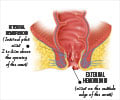Natural extract from the bark of the French maritime pine tree could help relieve symptoms of acute hemorrhoids and even prevent new attacks, a new study has shown.
Natural extract from the bark of the French maritime pine tree could help relieve symptoms of acute hemorrhoids and even prevent new attacks, a new study has shown.
Pycnogenol is a natural plant extract originating from the bark of the maritime pine that grows along the coast of southwest France and is found to contain a unique combination of procyanidins, bioflavonoids and organic acids, which offer extensive natural health benefits.A research team from G D'Annunzio University has found that pycnogenol has important anti-inflammatory and anti-thrombotic properties that may be beneficial in patients with hemorrhoids, both for acute and chronic treatment.
"Topical medications, lifestyle changes and careful hygiene are all that is needed for most patients to control symptoms of hemorrhoids," said Professor Peter Rohdewald, a co-author of the study.
"In this study, both topical and oral Pycnogenol treatment reduced the intensity and duration of hemorrhoidal pain and bleeding. Pycnogenol even reduced the number of procedures and hospital admissions caused by severe cases," he added.
During the study, most frequently observed signs and symptoms, including hemorrhoidal bleedings, severe perineal pain and intravascular thrombus, were evaluated.
The patients were randomly allocated to one of three treatment groups, as follows: Treatment of Group 1 consisted of initial 300 mg of Pycnogenol tablets daily for four days, followed by 150 mg per day for the following three days; Group 2 received the same treatment as Group 1, plus 0.5 percent
Advertisement
There was also a decrease in the recurrence of complications and overall treatment costs the month following in both Pycnogenol groups.
Advertisement
"This study clearly indicates that Pycnogenol is an effective, natural solution in controlling this common, disabling problem and may contribute to relieve hemorrhoidal attacks and offer pain relief," said Rohdewald.
The study is published in a recent issue of Phytotherapy Research.
Source-ANI
TRI










